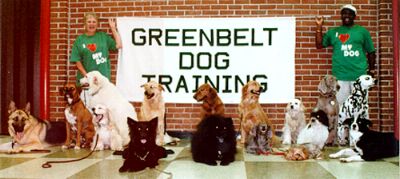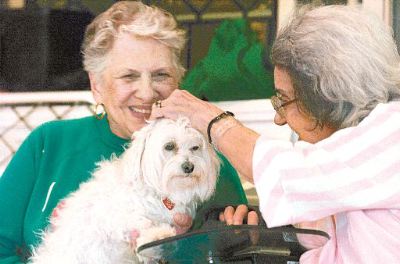GREENBELT
DOG
TRAINING

|

|
|
|
|
|
|||||
| by Michael Zimmerman Staff Writer |
 |
| Read original article at: http://www.gazette.net/stories/033006/princou171837_31939.shtml | |
You’ve heard the cliché, ‘‘A man’s best friend is his dog.” This appears to be true for dog owner Allie Lee, director of Greenbelt Dog Training.
Uncle Allie, as he is commonly known in his professional circles, has been an obedience instructor for more than 35 years. He has brought joy to many patients from nursing homes and hospitals with therapy dogs.
He and his wife of 18 years, Adele Lee, have a love and a concern for animal owners and their pets.
In 2004, the Children’s National Medical Center in Washington D.C. instituted an animal visitation program with the guidance and support of Greenbelt Dog Training. The program sponsors visits to the hospital’s inpatient units by Greenbelt-trained therapy dogs and their owners. The patients, their families and hospital staff thoroughly enjoy the visits of these dogs.
Terry Spearman from the Child Life Services at the center said the dogs are very popular.
‘‘The dogs perform tricks and it seems like everyone loves these animals,” Spearman said. ‘‘It’s a nice way for families to get this type of interaction, and it’s wonderful that the therapy dogs accommodate the need of the child.”
The therapy dogs may visit the patients in the medical center’s playrooms, giving the opportunity for the children who are patients to pet, feed and learn more about them.
Mike Barlous, a former student and volunteer, said he thinks the program is wonderful.
Barlous has three dogs he has had dogs for years.
‘‘I’ve respect what Allie has done because he gets dogs to respect you,” Barlous said. ‘‘I’ve seen his work with therapy dogs, and I’ve participated in some of the training. He’s done a great thing with them.”
Adele Lee said her husband is successful because he individualizes.
‘‘He’s a mastermind of dealing with people because if he looses a person, then he looses the dog,” she said.
Last week, the therapy dogs visited 10 children at the Hospital for Sick Children in the District, the playrooms at Children’s Hospital in the District and the National Rehabilitation Hospital.
Many of the therapy dog owners who are volunteers give out pictures of their dog to the patients they visit at the hospitals.
She said the dogs have to be able to trust whatever situation comes up and feel comfortable with people who are ill or have limited disabilities.
‘‘Our dogs have to be [accepting] of wheelchairs or people who have tubes,” Adele Lee said.
She said the volunteers have to be almost therapists or because they have to deal with all types of situations.
Allie Lee said the idea when he began giving demonstrations at dog show, hospitals, nursing homes school and community events.
He is also a pet screener for the Pets on Wheels (POW) organization, which has conducted over 170 free temperament tests for new dogs wanting to join the program and visit nursing homes.
Allie Lee said he looks at a dog’s temperament to determine if it is suitable for pet therapy work.
They should be calm and confident.
German shepherds, Labrador retrievers, Maltese and miniature pinchers are just some of the breeds that become therapy dogs.
‘‘I look for dogs who have to socialize with people and tolerate them pretty much like people do,” Allie Lee said.
He said his mother was a Neighborhood Advisory Commissioner in the District and spent a lot of time in the community.
‘‘She did volunteer work at Children’s Hospital so it came natural for me to give back,” he said.
Silver Spring resident Karen McNally, 55, a volunteer and student who owns a few therapy dogs, said she has had 10 dogs trained at Greenbelt Dog Training.
‘‘I have nothing but good things to say about the Greenbelt Dog Training program.” McNally said.
Some of the dogs jump through hoops, catch tennis balls or dance to music while some others just allow a patient to pet them.
‘‘We involve the patients in the activity that a particular therapy dog is able to perform,” Adele Lee said.
When they go to a hospital or nursing home or even a rehabilitation center, they go in that situation without asking questions.
‘‘We pray that we can touch someone because we don’t know what their situation is and we go in without asking questions,” she said ‘‘We hope that our dogs can be effective and can encourage the patients.”
Adele Lee said much of the credit goes to the numerous volunteers who help teach and the hours that they give with the therapy dogs.
‘‘They do it out of the goodness of their hearts,” she said.
E-mail Michael Zimmerman at mzimmerman@gazette.net.
Copyright © 2006 The Gazette - ALL RIGHTS RESERVED. Privacy Statement